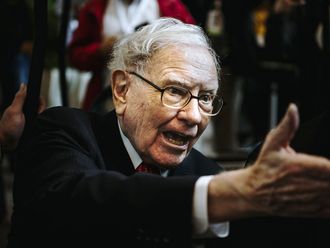
Can Saturn 821 million miles away, affect the way a Reliance Communications stock moves on the Bombay Sensitive Index on planet Earth?
Believe in it and you may see your hard-earned savings disappear, like Meena Biswas did. This 60-year-old housewife in the eastern Indian city of Kolkata, with little money or market experience, listened to a television astrologer connect Saturn with telecom and called her broker to buy some very expensive stocks, just when the Sensex was touching 21,000 in January 2008. The markets crashed and today Biswas is embarrassed to admit that she had been star-struck.
What guides common retail investors in India? Is it their gut instinct, technical analysts or the astrologer? Strange as it may sound, a new breed of self-styled "financial astrologers" have garnered prime television slots, set up sophisticated websites and call centres and managed to factor themselves into the stock market decisions people make.
It's a gamble people are willing to take. For those used to dealing with the vagaries of the market, there's little difference between astrologers and analysts. Sandeep Bagrodia, a 44-year-old investor, who owns chemical trading companies, puts the two in the same category.
Bagrodia has been playing the markets since 1990 and burnt his fingers listening to tips from TV analysts in the dotcom boom and bust cycle of the 1990s. "It is a game of luck. If you are to make money, you will. Astrological advice is as good or as bad as technical analysts. Both are professionals and have to earn their living."
The believers
Others are not so sceptical. Take Partha Bhattacharya, a 31-year-old insurance agent, also from Kolkata. Bhattacharya believes 11 is his "power number." He makes his stock market investments resolutely on the 11th of every month and buys or sells shares in multiples of 11—all on the advice of his suburban astrologer, Sukumar Bhattacharya. This small-time investor is convinced that 11 will bring him riches.
Natives of Kolkata are not known for their financial acumen, but travel to Gujarat, home to India's richest industrialists and stock market players, and here too the zodiac shines bright.
Ashwin Thakker, a practising chartered accountant in Ahmedabad, is a bold and savvy investor with 30 years of market experience. In March 2008, an astrologer-friend advised him to sell his entire portfolio when the Sensex was hovering around 18,000 and Thakker did so.
In the next few months, the Sensex free-fell to 8,000 and Thakker cornered a neat profit of 200 per cent and shifted to government securities before venturing in again in 2009. The 58-year-old is no gullible player; his instincts are firmly fixed on fundamentals and global trends; yet when it comes to crucial stock market decisions, he checks with his astrologer.
Startlingly, even hard-core banking men are not immune from the lure of astrology. Vinod Sharma, head of business — private brokering and wealth management at HDFC Securities, says he is a believer.
"More and more investors are trying to seek astrological help in making their investment decisions. While I use fundamentals and technical data to advise clients, there is no harm in keeping astrological advice in the back ground, while investing, But it should act as a second point of reference and not the first. Astrological forecasts act more as reminder to carry the umbrella while going out rather than deciding not to venture out for the day."
The deep-rooted faith Indians have in astrologers has been cleverly harnessed by many men of business. India's best-known astrologer Bejan Daruwalla, now in his 80s, corporatised what used to be a household, personalised service.
The zodiac men
In 2003, Daruwalla saw the potential of the web and signed on one Hemang Arun Pandeet, a techno-entrepreneur with an electronics degree. Daruwalla lent his formidable brand image and his band of astrologers and Pandeet turned it into GaneshaSpeaks.com, a successful dotcom business, tailor-made for clients seeking divine intervention.
Soon, major internet companies like Rediff, Sify, Indiatimes, Shaadi.com tied up with GaneshaSpeaks.com. In June 2003, a call centre was launched in Ahmedabad. Astrologers were trained to deliver forecasts within 30 seconds of receiving a call. It later became round-the-clock business, with call centres expanding to Delhi, Mumbai, Pune and Bangalore, according to S. Balasubramanian, head of Corporate Communications, GaneshaSpeaks. The company's call centres now employ more than 200 astrologers and handle more than 25,000 telephone consultations daily, apart from the 900-1,000 customers everyday on the web interface.
Another tech savvy stock market guru is Jaipur-based Lt Col Ajay, CEO of astromoneyguru.com and futurebazaronline.com. A regular on business channels and stock exchange seminars and webinars, Jain makes daily predictions through his websites and TV shows. His fees are high. Depending on the requirements of an individual or brokerage house, it starts from Rs9,000 (Dh703) up to more than Rs100,000.
Ajay runs his operations from Jaipur in western India with the help of his wife and five employees, providing daily stock predictions through SMS, weekly newsletters, personal consultancy and online financial astrology courses.
"Our website is different from other normal astrology sites because we predict movements of world stock, commodities and forex markets on an intraday basis before the market opens and predict daily intraday movement well in advance," he says. Ajay even trains young people in "financial astrology" and gives them "on-job training".
With demand for stellar help on the rise, it's little wonder that this is actually a career option for some in India. A representative of the All India Federation of Astrologers, which provides courses in astrology, says numerology and financial prediction courses have become more popular over the years.
Financial crisis and its impact
The 2008 world financial crisis was a trend-changing year in more ways than one. This was a time when high profile, venerated market analysts had their reputations in shreds. In these uncertain times, helpless Indian investors saw little difference between them and homegrown astrologers.
Ketan Shanghavi, 47, has been a passionate investor for the past 20 years. While astrologers are a no-no for him, Shanghavi says he depends a lot on his own instinct. When the world financial crisis barely began to unfold, Shanghavi sold his entire stock and booked profits. But when he saw that Indian markets were slow in reacting, he panicked, bought more stocks only to lose money when the markets tanked later. He regrets not heeding his instinct.
Sweta Killa, a technical analyst from Kolkata, feels small investors are always at a loss — whether they follow astrologers or newspapers. Killa, who has inside knowledge of how stock markets work, says price movement generally depends on how the big market operators choose to move. If they think a certain popular astrological website is influencing retail behaviour, they will factor it in.
Stock market veterans, however, are extremely wary of the rise of financial astrology and are more scathing. Kamal Parekh, ex-president of the Calcutta Stock Exchange and now chairman, Stewart Securities Ltd, a leading Kolkata based brokerage firm, says, "There is no correlation between astrologers and movement in the stock markets. There are some traders and speculators who use the help of these astrologers and spread all kinds of information. This simply misleads people on price movements."
Parekh says all equity investment is risk capital and people should only invest only surplus money into these segments. "Investors must also understand that economic, political, industrial factors and company performance affects stock market indices and the company market price. An investor should not bank on hearsay but try to examine these factors along with details of the balance sheet, profit and loss account, track record of the company."
So what makes Indian investors opt for a double jeopardy—taking specious advice for something inherently unpredictable? Hansal Bhachech, a well-known consultant psychiatrist in Ahmedabad, says: "People are always curious to know the future, more so when it is unpredictable. Common investors have little instinct or knowledge about the market. They see this as a means for making easy money. In such circumstances, they clutch on to whatever tips and predictions they come across."
Bhachech's home state Gujarat, where investors have maximum risk appetite, also sees a lot of financial stress. The psychiatrist says he has recorded a significant increase in the number of clients coming with financial problems. "Every sharp downward movement makes people anxious and depressed and sharp upward movement leads to elated and over confident behaviour. In many people, such mood and behaviour swings are severe enough for them to need a psychiatrist," he says.
Interestingly, astrology is not a legal profession in India. Prabir Ghosh, general secretary of the Science & Rationalists Association of India, states that according to a memo issued in November 2005, the Professional Tax Department of West Bengal withdrew all professional taxes imposed on astrologers, thereby making the profession illegal. This ruling is applicable throughout the country, yet Ghosh says not many realise its importance.
From time to time, the Rationalists Association throws a challenge to the astrologers across the country. They offer Rs2.5 million (Dh195,550) to any astrologer who can prove his or her claim—be it an outlandish health remedy or Parliamentary election results.
This time, the rationalists want to put up their kitty for anyone who can correctly predict the stock market for any one week! This network of activists have been battling for more than two decades to bust myths, superstitions and expose their pet hates—the astrologers.
Disclaimer: Gulf News in no way subscribes to astrology or anything related to it. But the topic has appeal to sections of different nationalities living in the UAE and hence decided to address it in an objective way. The writer is a freelance journalist based in China











